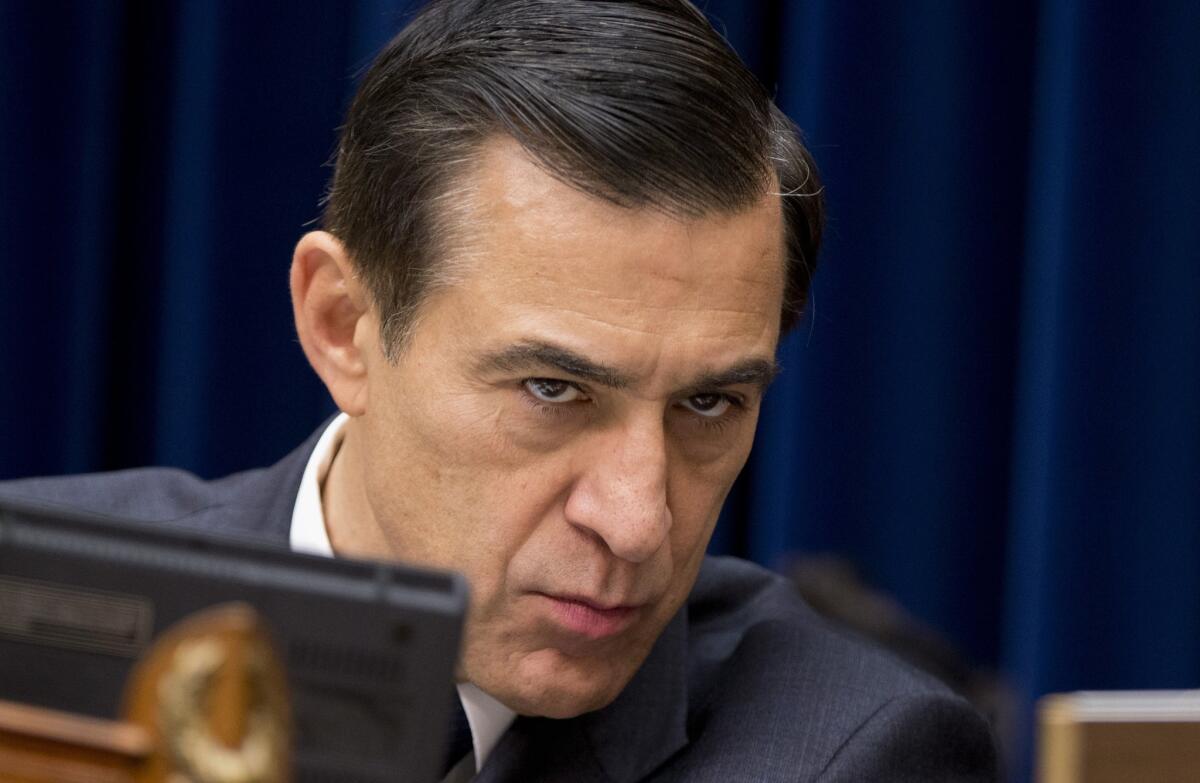Issa’s big dud: No White House connection to IRS ‘scandal’

Still hunting for that White House connection: Rep. Darrell Issa during a committee hearing in June.
Rep. Darrell Issa (R-Vista) wasted enormous congressional resources over the last 18 months trying to inflate the IRS “scandal” into a mountain. The release Tuesday of his final, petulant report on the affair marks what may be its final decline into a mouse.
The bottom line: Contrary to his assertions in countless appearances on Fox News, there’s no evidence that the Obama White House directed -- or indeed was involved in any way -- in the supposed targeting of conservative nonprofit groups for special scrutiny by the IRS. There’s no evidence that “tea party” groups were exclusively targeted, as opposed to tax-exempt “social welfare” organizations from across the political spectrum.
The evidence set forth in the report, which was issued by the House Committee on Oversight and Government Reform’s GOP majority without sharing it first with the Democratic minority, instead depicts an IRS struggling to apply complicated rules for nonprofits engaging in political activity, all without guidance from Congress.
As we reported earlier, the controversy involved groups claiming tax exemptions under section 501(c)4 of the tax code. These so-called c-4’s are supposed to be “social welfare” groups like volunteer fire departments. By law they’re barred from political activity, though the IRS has indulgently allowed them to be political as long as that’s not their “primary” activity. In recent years this murkiness has been exploited by openly political groups. Why? Because c-4’s are allowed to keep their donors secret. For a political organization, that’s gold.
Issa launched his investigation last spring with the charge that the IRS had screened c-4 applications for words such as “tea party” in their names in an effort to deprive conservative organizations of a tax exemption. As it turned out, the agency also looked for liberal code words like “progressive.” Issa’s report skates over this inconvenient fact in what may be my favorite passage in all its 226 pages:
“Of the applications that received additional scrutiny, only seven contained the word ‘progress’ or ‘progressive,’ all of which were subsequently approved by the IRS, while Tea Party groups received unprecedented review and experienced years-long delays.”
You can’t fully parse these words without a footnote, so here it is: No tea party groups were denied approval. In fact, only one c-4 organization lost its tax exemption because of this scrutiny -- the progressive group Emerge America, which trains Democratic women to run for office.
Issa was unable to document any participation whatsoever by White House officials in the screening or vetting process; his evidence shows that it was launched by the IRS office in Cincinnati, where the agency’s exempt organization branch was located. Ultimately the screening was referred up the line to IRS headquarters. That’s as far as Issa’s trail leads. Because he can’t trace it to the White House, he resorts to the claim that the IRS was responding to White House “rhetoric” complaining about political spending by tea party organizations.
“President Obama’s rhetoric against conservative-oriented groups -- rhetoric parroted by Democrats in Congress and the national media -- influenced how the IRS engaged with these groups,” the report states.
Much of the report underscores how flagrantly partisan and majestically useless Issa has been as a government watchdog. (He’s giving up the committee chairmanship in 2015 because of term limits, ceding the gavel to Republican Rep. Jason Chaffetz of Utah.) It treats political activities as somehow a legal right of c-4 organizations, though that’s not what the law says -- not if they want to retain their tax exemptions and donor confidentiality privileges.
Although the report ascribes the IRS’ intensified concern about these organizations to the Supreme Court’s 2010 Citizens United ruling, which opened the door to greater political spending by corporations, it overlooks that the ruling explicitly endorsed donor disclosure as a check on undue electoral influence by those donors. It acknowledges that groups such as the American Bar Assn., which is unlikely to be mistaken for a liberal hive, opposed the existing IRS standard that c-4’s could permissibly engage in politics as long as that accounted for 49% or less of their activities. The ABA thought the ceiling should be closer to 5%.
Does Issa understand the point of the tax law? The report suggests that the answer is no. It states, “The IRS sought to regulate politically active social-welfare groups” as though that’s a bad thing; in fact, it’s the IRS’ job. Nor are these efforts tantamount to an attempt “to stifle free political speech,” as the report says. They were designed to keep political groups of any kind from flouting a law passed by Congress. The principles of political speech have been enshrined in legislation and case law for decades: You can engage in it as much as you wish, but you can’t claim a tax deduction for it.
One point that the Issa report fails to make is that the investigation undoubtedly succeeded in its ulterior purpose, which was to hamstring the IRS in pursuing its statutory duties and undermined its already flagging reputation. Aggressive enforcement of the 501(c)4 standards is off the table. In the year-end spending bill passed this month, the agency’s budget was gutted -- cut by $356 million from last year, $1.5 billion below the administration’s request.
For Issa, who is Congress’ richest member, and plutocrats from shore to shore, an intimidated and underfunded IRS is heaven. And that’s what we’ve got.
Keep up to date with the Economy Hub. Follow @hiltzikm on Twitter, see our Facebook page, or email mhiltzik@latimes.com.







